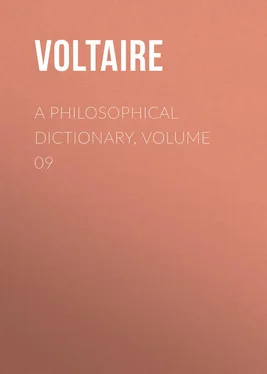It is not known at what time the Jews recognized Beelzebub, who was a strange god, as the prince of devils; but it is known, for Josephus tells us, that there were at Jerusalem exorcists appointed to cast out devils from the bodies of the possessed; that is, of such as were attacked by singular maladies, which were then in a great part of the world attributed to the malific genii.
These demons were then cast out by the true pronunciation of Jehovah, which is now lost, and by other ceremonies now forgotten.
This exorcism by Jehovah or by the other names of God, was still in use in the first ages of the church. Origen, disputing against Celsus, says to him: "If, when invoking God, or swearing by Him, you call Him 'the God of Abraham, Isaac, and Jacob,' you will by those words do things, the nature and force of which are such that the evil spirits submit to those who pronounce them; but if you call him by another name, as 'God of the roaring sea,' etc., no effect will be produced. The name of 'Israel,' rendered in Greek, will work nothing; but pronounce it in Hebrew with the other words required, and you will effect the conjuration."
The same Origen has these remarkable words: "There are names which are powerful from their own nature. Such are those used by the sages of Egypt, the Magi of Persia, and the Brahmins of India. What is called 'magic,' is not a vain and chimerical art, as the Stoics and Epicureans pretend. The names ' Sabaoth ' and ' Adonai ' were not made for created beings, but belong to a mysterious theology which has reference to the Creator; hence the virtue of these names when they are arranged and pronounced according to rule."
Origen, when speaking thus, is not giving his private opinion; he is but repeating the universal opinion.
All the religions then known admitted a sort of magic, which was distinguished into celestial magic, and infernal magic, necromancy and theurgy – all was prodigy, divination, oracle. The Persians did not deny the miracles of the Egyptians, nor the Egyptians those of the Persians. God permitted the primitive Christians to be persuaded of the truth of the oracles attributed to the Sibyls, and left them a few other unimportant errors, which were no essential detriment to their religion. Another very remarkable thing is, that the Christians of the primitive ages held temples, altars, and images in abhorrence. Origen acknowledges this (No. 347). Everything was afterwards changed, with the discipline, when the Church assumed a permanent form.
FOURTH QUESTION
When once a religion is established in a state, the tribunals are all employed in perverting the continuance or renewal of most of the things that were done in that religion before it was publicly received. The founders used to assemble in private, in spite of magistrates; but now no assemblies are permitted but public ones under the eyes of the law, and all concealed associations are forbidden. The maxim formerly was, that "it is better to obey God than man"; the opposite maxim is now adopted, that "to follow the laws of the state is to obey God." Nothing was heard of but obsessions and possessions; the devil was then let loose upon the world, but now the devil stays at home. Prodigies and predictions were necessary; now they are no longer admitted: a man who in the places should foretell calamities, would be sent to a madhouse. The founders secretly received the money of the faithful; but now, a man who should gather money for his own disposal, without being authorized by the law, would be brought before a court of justice to answer for so doing. Thus the scaffoldings that have served to build the edifice are no longer made use of.
FIFTH QUESTION
After our own holy religion, which indubitably is the only good one, what religion would be the least objectionable?
Would it not be that which should be the simplest; that which should teach much morality and very few dogmas; that which should tend to make men just, without making them absurd; that which should not ordain the belief of things impossible, contradictory, injurious to the Divinity, and pernicious to mankind; nor dare to threaten with eternal pains whosoever should possess common sense? Would it not be that which should not uphold its belief by the hand of the executioner, nor inundate the earth with blood to support unintelligible sophisms; that in which an ambiguous expression, a play upon words, and two or three supported charters, should not suffice to make a sovereign and a god of a priest who is often incestuous, a murderer, and a poisoner; which should not make kings subject to this priest; that which should teach only the adoration of one God, justice, tolerance, and humanity.
SIXTH QUESTION
It has been said, that the religion of the Gentiles was absurd in many points, contradictory, and pernicious; but have there not been imputed to it more harm than it ever did, and more absurdities than it ever preached?
Конец ознакомительного фрагмента.
Текст предоставлен ООО «ЛитРес».
Прочитайте эту книгу целиком, купив полную легальную версию на ЛитРес.
Безопасно оплатить книгу можно банковской картой Visa, MasterCard, Maestro, со счета мобильного телефона, с платежного терминала, в салоне МТС или Связной, через PayPal, WebMoney, Яндекс.Деньги, QIWI Кошелек, бонусными картами или другим удобным Вам способом.












